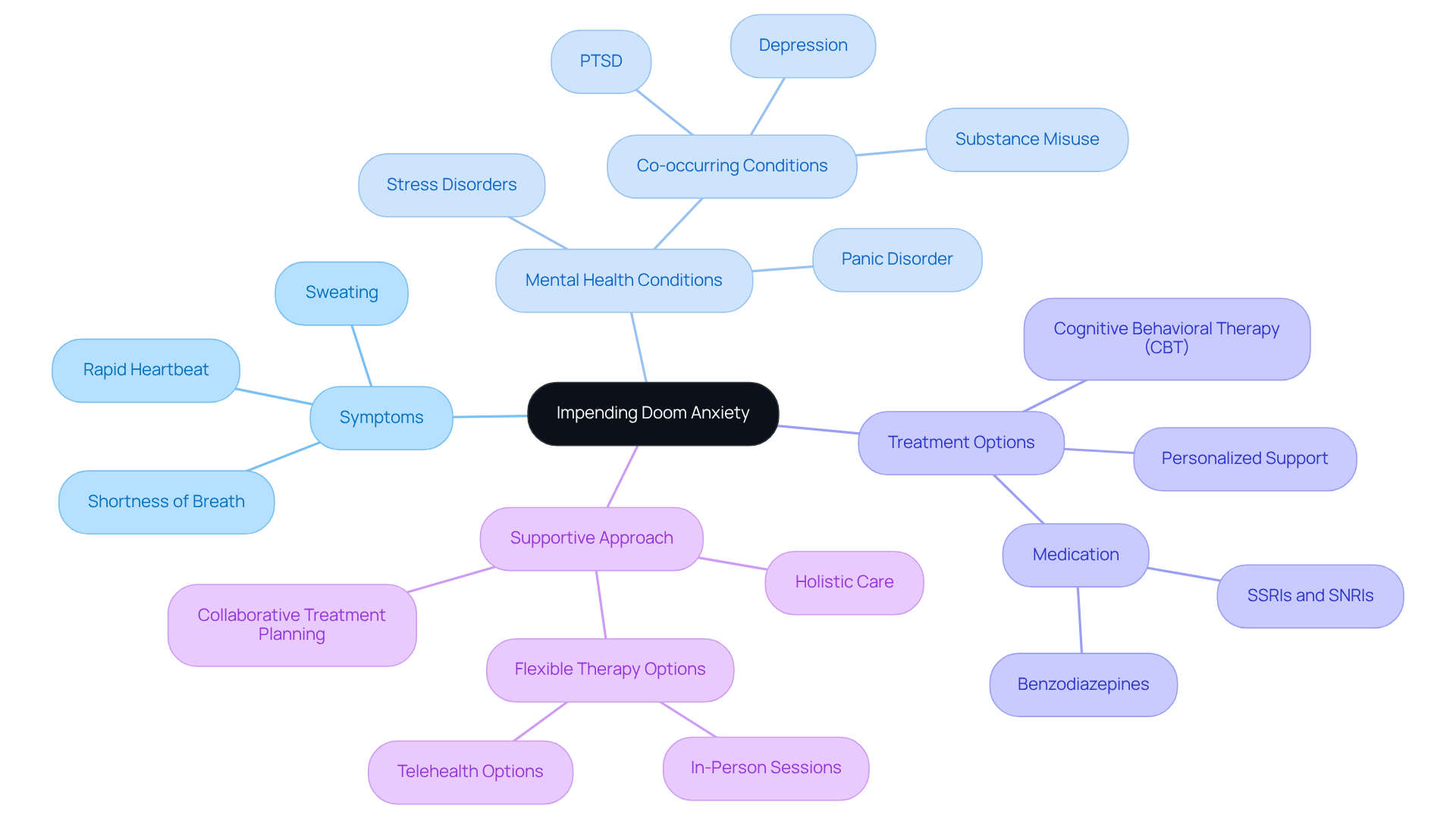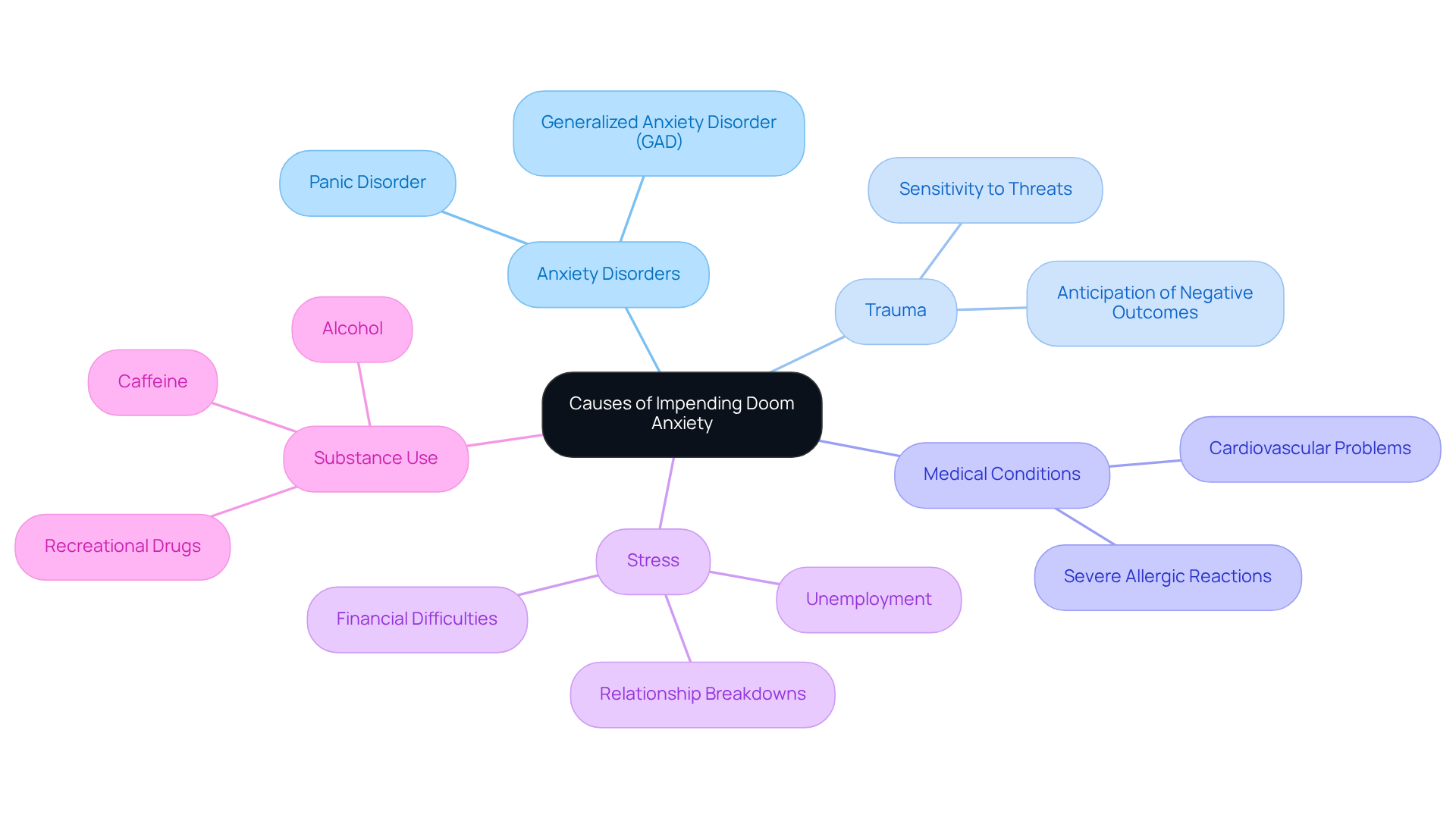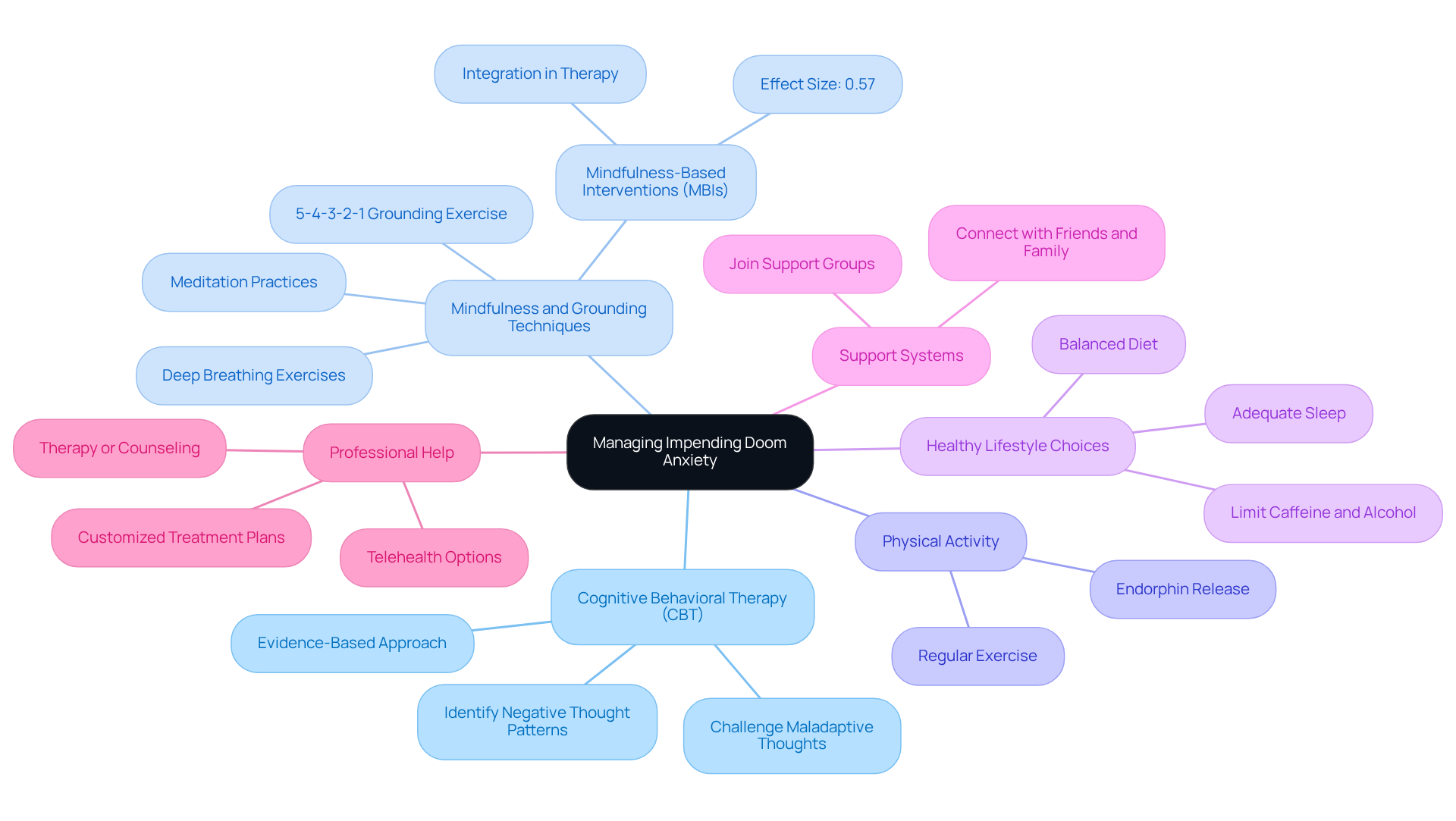Overview
Impending doom anxiety can feel overwhelming, often manifesting as an intense sense of dread or fear of an imminent catastrophe. This experience is frequently linked to various mental health conditions, trauma, and stressors that many individuals face. Have you ever felt overwhelmed by your past? Understanding the causes, such as anxiety disorders and trauma, is the first step towards healing.
To manage these feelings effectively, consider exploring techniques like:
- Cognitive Behavioral Therapy (CBT)
- Mindfulness practices
- Lifestyle changes
Each of these approaches offers a pathway to finding peace and clarity. Remember, seeking professional support is vital in navigating these emotions, as it can provide the guidance and understanding you deserve.
As we explore this further, it’s important to acknowledge that you are not alone in this journey. Many people experience similar feelings, and there are compassionate resources available to help you. Embracing these management techniques can lead to a more balanced and fulfilling life, allowing you to reclaim your sense of safety and well-being.
Introduction
Experiencing a sudden and overwhelming sense of impending doom can be a disconcerting reality for many individuals, often leaving them questioning their mental health and well-being. Have you ever felt overwhelmed by your past? This anxiety, which may stem from various sources such as trauma, stress, or even physical conditions, can manifest in distressing physical symptoms that exacerbate feelings of fear.
Understanding the nuances behind impending doom anxiety is crucial, as it opens the door to effective management techniques and coping strategies. As we explore this further, how can one navigate the complexities of this anxiety and reclaim a sense of peace amidst the chaos? This journey towards healing is not only possible but also a compassionate path worth taking.
Define Impending Doom Anxiety
Have you ever experienced an overwhelming sense of impending doom anxiety? This apprehension can manifest as an intense, sudden feeling of impending doom anxiety, suggesting that a catastrophic event or life-threatening situation is just around the corner, even when there’s no real danger present. It’s important to recognize that this sensation often ties back to various mental health conditions, including impending doom anxiety, stress disorders, panic attacks, and trauma-related issues. Those experiencing impending doom anxiety may find themselves facing physical symptoms such as a rapid heartbeat, sweating, and shortness of breath, which only serve to heighten their distress.
Understanding these feelings is essential, as they act as warning signals from your body, indicating that something requires attention. At The Emerald Couch, we genuinely care about your mental health journey. We offer treatment alternatives, including , which many find effective in managing panic disorder and the associated impending doom anxiety. Our approach is rooted in personalized support, beginning with a complimentary 30-minute consultation designed to understand your unique needs.
We believe in customizing our services to each individual, ensuring that your treatment plan is collaborative and centered on your definition of success. It’s crucial to remember that treatment outcomes can differ; many clients report feeling better or noticing improvements within 4-6 weeks. Additionally, research indicates that nearly 50% of those diagnosed with depression also have a co-occurring mood disorder, highlighting the importance of seeking professional assistance.
At The Emerald Couch, our holistic approach fosters a supportive environment where you can explore your mental health needs and develop effective coping strategies. We offer flexible therapy options, available for both in-person and virtual appointments, ensuring you have the support you need on your journey to healing. You are not alone in this; we are here to help you every step of the way.

Identify Causes of Impending Doom Anxiety
Understanding the can be complex, often arising from a blend of mental and physical factors. It's important to recognize these triggers, as they can significantly affect our well-being. Have you ever felt overwhelmed by your past? Let’s explore some common causes together:
- Anxiety Disorders: Conditions such as generalized anxiety disorder (GAD) and panic disorder can create a persistent sense of impending doom. This heightened state of alertness often leaves individuals feeling fearful and on edge.
- Trauma: Those with a history of trauma may find themselves more sensitive to perceived threats. This sensitivity can lead to constant worry about potential dangers in the future. For instance, someone who has faced a traumatic event might feel perpetually anxious, anticipating negative outcomes.
- Medical Conditions: Medical conditions such as cardiovascular problems or severe allergic reactions can trigger feelings of impending doom anxiety as a physiological response. These conditions may mimic panic-like symptoms, intensifying feelings of discomfort and unease.
- Stress: Ongoing pressures from significant life events—such as unemployment, relationship breakdowns, or financial difficulties—can exacerbate feelings of worry. This stress can make individuals more susceptible to sensations of fear and anxiety.
- Substance Use: The consumption of stimulants, including caffeine, alcohol, and recreational drugs, can heighten feelings of unease, contributing to impending doom anxiety and a sense of impending disaster.
Recognizing these causes is essential for understanding our triggers. By doing so, we can take effective steps towards healing, whether through therapy or lifestyle adjustments. Remember, you are not alone in this journey, and seeking help is a courageous and vital step towards managing your stress.

Implement Management Techniques for Impending Doom Anxiety
Managing impending doom anxiety requires a multifaceted approach that combines self-care strategies, therapeutic techniques, and lifestyle adjustments. Have you ever felt overwhelmed by anxiety? Here are some effective methods to consider:
- Cognitive Behavioral Therapy (CBT): This evidence-based approach empowers you to identify and challenge negative thought patterns that fuel anxiety. Studies show that is highly effective in diminishing symptoms of distress, establishing it as a cornerstone of treatment.
- Mindfulness and Grounding Techniques: Engaging in practices such as deep breathing, meditation, and the 5-4-3-2-1 grounding exercise can help you stabilize in the present moment, alleviating feelings of dread. Mindfulness-based interventions (MBIs) have been demonstrated to significantly lower levels of distress, with studies reporting a weighted mean effect size of 0.57, indicating moderate effectiveness. At The Emerald Couch, we emphasize the integration of mindfulness techniques in therapy, as they provide valuable tools for managing symptoms and enhancing personal growth. As Elizabeth Hoge, MD, observes, mindfulness meditation is a beneficial approach for stress disorders, providing individuals with techniques to manage their experiences.
- Physical Activity: Regular exercise is a powerful tool for alleviating stress symptoms. It releases endorphins, which enhance mood and promote a sense of well-being, contributing to overall mental health.
- Healthy Lifestyle Choices: Maintaining a balanced diet, ensuring adequate sleep, and limiting caffeine and alcohol intake can profoundly influence stress levels. These lifestyle adjustments support both physical and mental health, creating a foundation for resilience.
- Support Systems: Connecting with friends, family, or support groups can provide emotional relief and reduce feelings of isolation. Exchanging experiences and obtaining assistance from others can be invaluable in handling stress.
- Professional Help: Seeking therapy or counseling offers customized strategies and support for effectively managing stress. At The Emerald Couch, our therapists provide tailored treatment plans, including telehealth options, to improve coping strategies for different stress-related disorders, such as Generalized Anxiety Disorder, OCD, and phobias. A study comparing Mindfulness-Based Stress Reduction (MBSR) to escitalopram found that both methods resulted in statistically equivalent decreases in stress symptoms after eight weeks, emphasizing the effectiveness of mindfulness techniques.
By implementing these techniques, you can cultivate resilience and reduce the impact of impending doom anxiety on your daily life. Remember, seeking help is a strong step towards healing.

Conclusion
Experiencing impending doom anxiety can be a distressing reality for many, characterized by an overwhelming sense of fear and anticipation of disaster without any tangible threat. Recognizing and understanding this anxiety is the first step toward managing it effectively. Have you ever felt this way? Acknowledging the underlying causes—such as anxiety disorders, trauma, medical conditions, stress, and substance use—is essential. Exploring various management techniques can lead to relief and improved mental health.
Throughout this article, we have shared key insights on the nature of impending doom anxiety, its triggers, and effective coping strategies. The following components emerge as vital in combating this anxiety:
- Cognitive Behavioral Therapy (CBT)
- Mindfulness practices
- Physical activity
- Healthy lifestyle choices
- Robust support systems
Additionally, the importance of seeking professional help cannot be overstated. Tailored therapeutic interventions can provide significant relief and resilience-building.
Ultimately, the message is clear: while impending doom anxiety can be daunting, it is manageable. By taking proactive steps toward understanding and addressing this anxiety, individuals can reclaim their peace of mind and enhance their overall well-being. Embracing support, whether through therapy or community, is a courageous and essential step in this journey. Remember, the path to healing is not walked alone; there are resources and people ready to help navigate through the complexities of anxiety.
Frequently Asked Questions
What is impending doom anxiety?
Impending doom anxiety is an overwhelming feeling that a catastrophic event or life-threatening situation is imminent, even when there is no real danger present. It is often associated with various mental health conditions, including stress disorders, panic attacks, and trauma-related issues.
What physical symptoms are associated with impending doom anxiety?
Individuals experiencing impending doom anxiety may encounter physical symptoms such as a rapid heartbeat, sweating, and shortness of breath, which can increase their distress.
How can understanding impending doom anxiety help?
Understanding impending doom anxiety is essential as it serves as a warning signal from the body, indicating that something requires attention. Recognizing these feelings can lead to seeking appropriate support and treatment.
What treatment options are available for managing impending doom anxiety?
Treatment options include Cognitive Behavioral Therapy (CBT), which many find effective for managing panic disorder and associated anxiety. Treatment plans are personalized and collaborative, starting with a complimentary 30-minute consultation.
How long does it typically take to notice improvements from treatment?
Many clients report feeling better or noticing improvements within 4-6 weeks of starting treatment.
What is the significance of co-occurring mood disorders?
Research indicates that nearly 50% of those diagnosed with depression also have a co-occurring mood disorder, highlighting the importance of seeking professional assistance for comprehensive care.
What kind of therapy options does The Emerald Couch offer?
The Emerald Couch offers flexible therapy options, including both in-person and virtual appointments, to ensure clients receive the support they need on their journey to healing.




